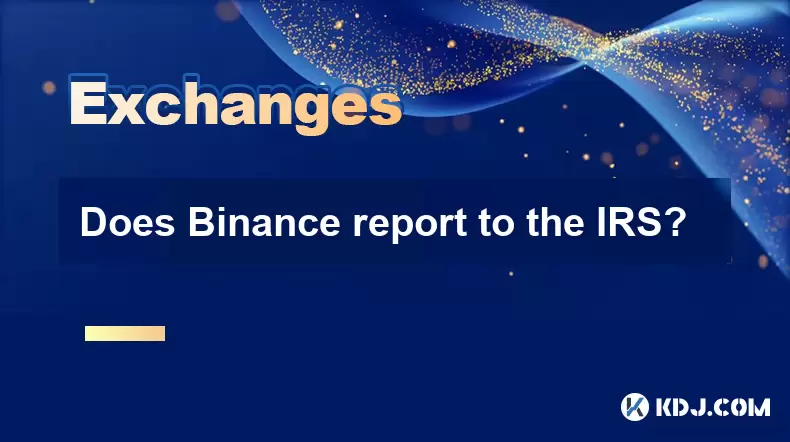-
 bitcoin
bitcoin $87959.907984 USD
1.34% -
 ethereum
ethereum $2920.497338 USD
3.04% -
 tether
tether $0.999775 USD
0.00% -
 xrp
xrp $2.237324 USD
8.12% -
 bnb
bnb $860.243768 USD
0.90% -
 solana
solana $138.089498 USD
5.43% -
 usd-coin
usd-coin $0.999807 USD
0.01% -
 tron
tron $0.272801 USD
-1.53% -
 dogecoin
dogecoin $0.150904 USD
2.96% -
 cardano
cardano $0.421635 USD
1.97% -
 hyperliquid
hyperliquid $32.152445 USD
2.23% -
 bitcoin-cash
bitcoin-cash $533.301069 USD
-1.94% -
 chainlink
chainlink $12.953417 USD
2.68% -
 unus-sed-leo
unus-sed-leo $9.535951 USD
0.73% -
 zcash
zcash $521.483386 USD
-2.87%
Does Binance report to the IRS?
Binance.US reports user transactions to the IRS, while Binance.com does not proactively share data but may comply with legal requests.
Jul 04, 2025 at 03:29 pm

Understanding Binance and Its Global Regulatory Position
Binance is one of the largest cryptocurrency exchanges in the world by trading volume. As a global platform, it operates across multiple jurisdictions, which means it must navigate various regulatory environments. For users based in the United States or those who hold U.S. assets, a critical concern arises: does Binance report to the IRS? This question stems from growing scrutiny over cryptocurrency taxation and compliance with financial reporting standards.
The Internal Revenue Service (IRS) treats cryptocurrency as property for tax purposes, meaning transactions involving digital assets may be subject to capital gains taxes. Exchanges that operate within the U.S. or serve U.S. customers are often required to collect user data and report certain activities to the IRS using forms like 1099-K or 1099-B.
However, Binance does not directly operate within the U.S. due to regulatory restrictions.Instead, U.S. users typically access services through a separate entity known as Binance.US, which is a licensed and regulated platform specifically designed to comply with American laws.
Data Collection Practices on Binance
Before examining whether Binance reports to the IRS, it's essential to understand what information the platform collects. Like most major exchanges, Binance requires users to undergo Know Your Customer (KYC) procedures before accessing advanced features such as higher withdrawal limits or fiat trading pairs.
This KYC process involves collecting personal information such as:
- Full name
- Date of birth
- Residential address
- Government-issued ID (passport, driver’s license)
- Proof of address
However, if an account shows signs of U.S. ties—such as IP address location, email domain, or payment methods—users may be redirected to Binance.US.
Binance.US and IRS Reporting Obligations
Unlike its international counterpart, Binance.US is fully compliant with U.S. regulations, including Anti-Money Laundering (AML) laws and IRS reporting requirements. Since Binance.US operates under U.S. jurisdiction, it must adhere to the same rules as other domestic exchanges like Coinbase or Kraken.
In line with IRS guidelines:
- Binance.US issues Form 1099-MISC or 1099-K to eligible users who meet specific transaction thresholds.
- It maintains records of all taxable events, including crypto-to-fiat trades and staking rewards.
- The platform shares this information with the IRS annually, just like traditional brokerage firms.
International users on Binance.com are generally not included in this reporting unless they have been flagged for potential U.S. residency or citizenship.
How Does Binance Handle Tax Documentation?
On Binance.com, there is no automatic generation of IRS-specific tax documents. However, users can manually download their transaction history and generate reports compatible with popular tax software platforms like CoinTracking or CryptoTaxCalculator.
Steps to prepare your own tax documentation include:
- Navigating to the 'Transaction History' section under your wallet
- Exporting CSV files containing all relevant trades, deposits, and withdrawals
- Uploading these files to a crypto tax tool for processing
- Reviewing the generated report for accuracy
- Filing the report along with your annual tax return
This responsibility lies entirely with the individual, especially when using the international version of the platform.
Implications of Using Binance Internationally vs. Domestically
Using Binance internationally versus domestically has significant implications regarding transparency with tax authorities. While Binance.com does not actively report to the IRS, it may cooperate with law enforcement agencies upon legal request.
Additionally:
- Users who engage in suspicious activity might attract attention from global regulators
- Cross-border transfers between Binance and U.S.-based wallets could raise flags
- Staking or earning interest on crypto may trigger new reporting obligations
Failure to report cryptocurrency income or gains can lead to audits, penalties, or even criminal charges.
Frequently Asked Questions
What happens if I don’t report my Binance transactions to the IRS?Failure to report cryptocurrency transactions can result in audits, fines, or criminal investigations. Even if Binance doesn't report directly, the IRS can obtain your data through subpoenas or third-party tools analyzing blockchain activity.
Can the IRS track my Binance.com transactions?Yes, the IRS can potentially track transactions via blockchain analysis tools and subpoena power. While Binance.com doesn't proactively report to the IRS, it may comply with legal requests for user data.
Is Binance.US safer than Binance.com for U.S. taxpayers?Binance.US provides greater legal clarity and compliance support for U.S. taxpayers. It generates IRS-compatible tax forms and adheres to U.S. financial regulations, reducing the risk of non-compliance.
Do I need to pay taxes if I only trade crypto-to-crypto on Binance?Yes, crypto-to-crypto trades are taxable events in the U.S. You must calculate capital gains or losses and report them accordingly, even if no fiat currency is involved.
Disclaimer:info@kdj.com
The information provided is not trading advice. kdj.com does not assume any responsibility for any investments made based on the information provided in this article. Cryptocurrencies are highly volatile and it is highly recommended that you invest with caution after thorough research!
If you believe that the content used on this website infringes your copyright, please contact us immediately (info@kdj.com) and we will delete it promptly.
- Big Apple Bites: While Ethereum Grapples, DeepSnitch AI Whispers of a 1000x Run
- 2026-02-07 06:30:02
- Token cat appointments furong tian to lead audit Amdst Strategic Reshffle
- 2026-02-07 06:40:01
- Brent Key Forges Georgia Tech's "Bully Ball" Identity, Reshaping ACC Competitiveness
- 2026-02-07 07:10:01
- Bithumb's Bitcoin Flash Crash: Billions in Error, Millions in Losses
- 2026-02-07 07:10:01
- Stock Strategy, Market Collapse, and Rebound: Navigating the Bitcoin Rollercoaster
- 2026-02-07 07:05:01
- Metaplanet Faces Mounting Pressure as Bitcoin Dives, CEO Affirms Unwavering Accumulation Strategy
- 2026-02-07 04:15:01
Related knowledge

How to contact Bybit customer support for urgent help?
Feb 05,2026 at 11:40pm
Accessing Bybit Support via Live Chat1. Log in to your Bybit account using the official website or mobile application. 2. Navigate to the Help Center ...

How to use Bybit Dual Asset investment for high yield?
Feb 06,2026 at 12:20am
Understanding Bybit Dual Asset Investment Mechanics1. Dual Asset Investment is a structured product offered by Bybit that combines a stablecoin deposi...

How to buy Aptos (APT) on Bybit today?
Feb 06,2026 at 07:40am
Creating a Bybit Account1. Navigate to the official Bybit website and click the “Sign Up” button located at the top right corner of the homepage. Ente...

How to use Bybit Shark Fin for principal-protected returns?
Feb 06,2026 at 03:40pm
Understanding Shark Fin Structure1. Shark Fin products on Bybit are structured derivatives designed to offer capital protection while enabling exposur...

How to buy Worldcoin (WLD) on Bybit exchange?
Feb 05,2026 at 04:39pm
Account Registration and Verification1. Navigate to the official Bybit website and click the 'Sign Up' button located in the top-right corner. 2. Ente...

How to buy Render (RNDR) on Bybit exchange?
Feb 05,2026 at 01:39pm
Creating and Verifying Your Bybit Account1. Visit the official Bybit website and click the “Sign Up” button located at the top right corner of the hom...

How to contact Bybit customer support for urgent help?
Feb 05,2026 at 11:40pm
Accessing Bybit Support via Live Chat1. Log in to your Bybit account using the official website or mobile application. 2. Navigate to the Help Center ...

How to use Bybit Dual Asset investment for high yield?
Feb 06,2026 at 12:20am
Understanding Bybit Dual Asset Investment Mechanics1. Dual Asset Investment is a structured product offered by Bybit that combines a stablecoin deposi...

How to buy Aptos (APT) on Bybit today?
Feb 06,2026 at 07:40am
Creating a Bybit Account1. Navigate to the official Bybit website and click the “Sign Up” button located at the top right corner of the homepage. Ente...

How to use Bybit Shark Fin for principal-protected returns?
Feb 06,2026 at 03:40pm
Understanding Shark Fin Structure1. Shark Fin products on Bybit are structured derivatives designed to offer capital protection while enabling exposur...

How to buy Worldcoin (WLD) on Bybit exchange?
Feb 05,2026 at 04:39pm
Account Registration and Verification1. Navigate to the official Bybit website and click the 'Sign Up' button located in the top-right corner. 2. Ente...

How to buy Render (RNDR) on Bybit exchange?
Feb 05,2026 at 01:39pm
Creating and Verifying Your Bybit Account1. Visit the official Bybit website and click the “Sign Up” button located at the top right corner of the hom...
See all articles










































































